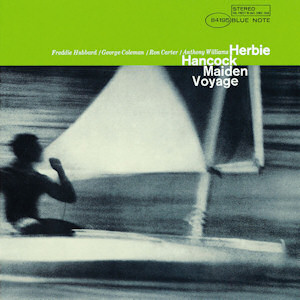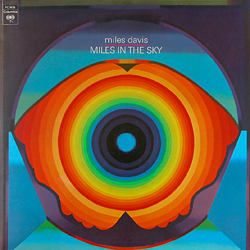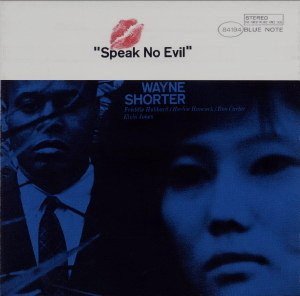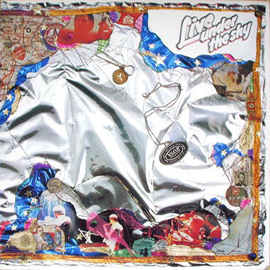
Herbert Jeffrey Hancock is an American jazz pianist, keyboardist, bandleader, composer, and occasional actor. Hancock started his career with trumpeter Donald Byrd's group. He shortly thereafter joined the Miles Davis Quintet, where he helped to redefine the role of a jazz rhythm section and was one of the primary architects of the post-bop sound. In the 1970s, Hancock experimented with jazz fusion, funk, and electro styles, utilizing a wide array of synthesizers and electronics. It was during this period that he released perhaps his best-known and most influential album, Head Hunters.

Head Hunters is the twelfth studio album by American pianist and composer Herbie Hancock, released October 26, 1973, on Columbia Records. Recording sessions for the album took place in the evening at Wally Heider Studios and Different Fur Trading Co. in San Francisco, California. The album was a commercial and artistic breakthrough for Hancock, crossing over to funk and rock audiences and bringing jazz-funk fusion to mainstream attention, peaking at number 13 on the Billboard 200. Hancock is featured with his ‘Mwandishi’ saxophonist Bennie Maupin and new collaborators- bassist Paul Jackson, percussionist Bill Summers and drummer Harvey Mason. All of the musicians play multiple instruments.

Maiden Voyage is the fifth album led by jazz musician Herbie Hancock, and was recorded by Rudy Van Gelder on March 17, 1965, for Blue Note Records. It was issued as BLP 4195 and BST 84195. Featuring Hancock with tenor saxophonist George Coleman, trumpeter Freddie Hubbard, bassist Ron Carter and drummer Tony Williams, it is a concept album aimed at creating an oceanic atmosphere. As such, many of the track titles refer to marine biology or the sea, and the musicians develop the concept through their use of space. The album was presented with the Grammy Hall of Fame Award in 1999.

Miles Smiles is an album by jazz musician Miles Davis, released in January 1967 on Columbia Records. It was recorded by Davis and his second quintet at Columbia 30th Street Studio in New York City on October 24 and October 25, 1966. It is the second of six albums recorded by Davis's second great quintet, which featured tenor saxophonist Wayne Shorter, pianist Herbie Hancock, bassist Ron Carter and drummer Tony Williams.

Nefertiti is a studio album by American jazz musician Miles Davis, released in March 1968. Recorded on June 7, June 22–23 and July 19, 1967, at Columbia's 30th Street Studio, the album was Davis' last fully acoustic album. Davis himself did not contribute any compositions- three were written by tenor saxophonist Wayne Shorter, two by pianist Herbie Hancock and one by drummer Tony Williams.

Miles in the Sky is a studio album by American trumpeter and composer Miles Davis, released on July 22, 1968, by Columbia Records. It was the last full album recorded by Davis' "Second Great Quintet" and marked the beginning of his foray into jazz fusion, with Hancock playing electric piano and Carter playing electric bass guitar on “Stuff”. Additionally, electric guitarist George Benson features on “Paraphernalia”.

Jack Johnson is a studio album and soundtrack by American jazz trumpeter, composer, and bandleader Miles Davis. It was released on February 24, 1971, by Columbia Records.

Future 2 Future is the forty-third album by Herbie Hancock. Hancock reunited with producer Bill Laswell. The two tried to repeat the success of the three previous albums that combine jazz with electronic music.

Speak No Evil is the sixth album by Wayne Shorter. It was released in June 1966 by Blue Note Records. The music combines elements of hard bop and modal jazz, and features Shorter on tenor saxophone, trumpeter Freddie Hubbard, pianist Herbie Hancock, bassist Ron Carter and drummer Elvin Jones. The cover photo is of Shorter's first wife, Teruko (Irene) Nakagami, whom he met in 1961.

Adam's Apple is the tenth album by post-bop jazz artist Wayne Shorter. Recorded in 1966 and released in 1967, it included the first recording of his composition "Footprints", later recorded by the Miles Davis Quintet for the album Miles Smiles (1967). Shorter is featured with pianist Herbie Hancock, bassist Reggie Workman and drummer Joe Chambers. The CD release includes the Hancock composition "The Collector" as a bonus track.

Possibilities is the forty-fifth studio album by American jazz pianist Herbie Hancock, released on August 30, 2005, by Hear Music and Vector Recordings.

Thrust is a studio album by American jazz-funk musician Herbie Hancock, released in September 1974 on Columbia Records. The album reached No. 2 on the Billboard Top Soul Albums chart and No. 13 on the Billboard 200 chart. It is the second album featuring The Headhunters: saxophonist Bennie Maupin, bass guitarist Paul Jackson, drummer Mike Clark and percussionist Bill Summers.

Sound-System is the thirty-sixth album by jazz pianist Herbie Hancock and the second of three albums co-produced by Bill Laswell with the ‘Rockit’ Band. Guest artists include saxophonist Wayne Shorter, guitarist Henry Kaiser, kora player/percussionist Foday Musa Suso and drummer Anton Fier.

The New Standard is the fortieth album by jazz pianist Herbie Hancock, released in 1996 on Verve. It consists of jazz renditions of classic and contemporaneous rock and R&B songs. It features an all-star sextet with saxophonist Michael Brecker, guitarist John Scofield, bassist Dave Holland, percussionist Don Alias and drummer Jack DeJohnette.

Gershwin's World is a studio album by the American jazz pianist Herbie Hancock. Prominent guests include Joni Mitchell, Kathleen Battle, Stevie Wonder, Wayne Shorter and Chick Corea.

V.S.O.P : Live Under the Sky is a 1979 live album by the V.S.O.P. Quintet, a record of a performance at the 1979 Live Under the Sky Festival as it was performed live in Japan over two days. The first day, which took place during a furious rainstorm, was broadcast live on national television. The original release featured the first day, while the 2004 re-master/re-release also featured the second concert. This, the fourth VSOP release, once again featured pianist Herbie Hancock, saxophonist Wayne Shorter, drummer Tony Williams, bassist Ron Carter and trumpeter Freddie Hubbard.

Water Babies is a compilation album by American jazz trumpeter Miles Davis. It compiled music Davis recorded in studio sessions with his quintet in 1967 and 1968, including outtakes from his 1968 album Nefertiti and recordings that foreshadowed his direction on In a Silent Way (1969), while covering styles such as jazz fusion and post-bop. Water Babies was released by Columbia Records in 1976 after Davis had (temporarily) retired.

The All Seeing Eye is the ninth jazz album by saxophonist Wayne Shorter, recorded on October 15, 1965, and released on the Blue Note label as BLP 4219 and BST 84219 in 1966. The album features performances by Shorter with trumpeter Freddie Hubbard, trombonist Grachan Moncur III, alto saxophonist James Spaulding, pianist Herbie Hancock, bassist Ron Carter and drummer Joe Chambers. Shorter's brother, Alan composed and plays fluegelhorn on the final track, “Mephistopheles”. The AllMusic review by Scott Yanow states: "it is clear from the start that the music on this CD reissue is not basic bop and blues... the dramatic selections, and their brand of controlled freedom has plenty of subtle surprises. This is stimulating music that still sounds fresh over three decades later".

The Piano is the twenty-sixth album by Herbie Hancock.

The Imagine Project is the forty-sixth and latest studio album by American jazz pianist Herbie Hancock released on June 22, 2010. Prominent guests include John Legend, India Arie, Seal, Dave Matthews, Jeff Beck, Chaka Khan, Tedeschi & Trucks, The Chieftains and Los Lobos.




















